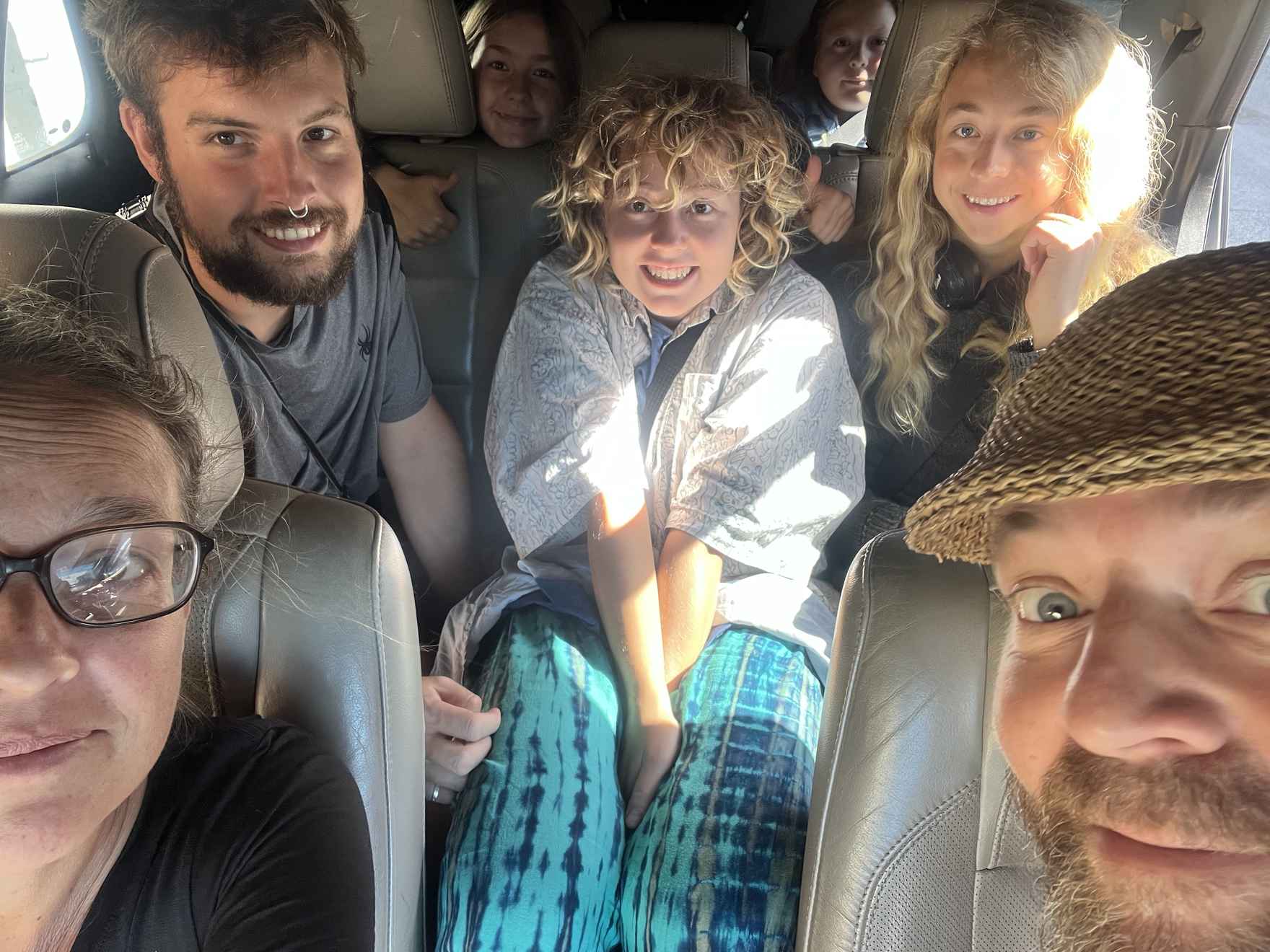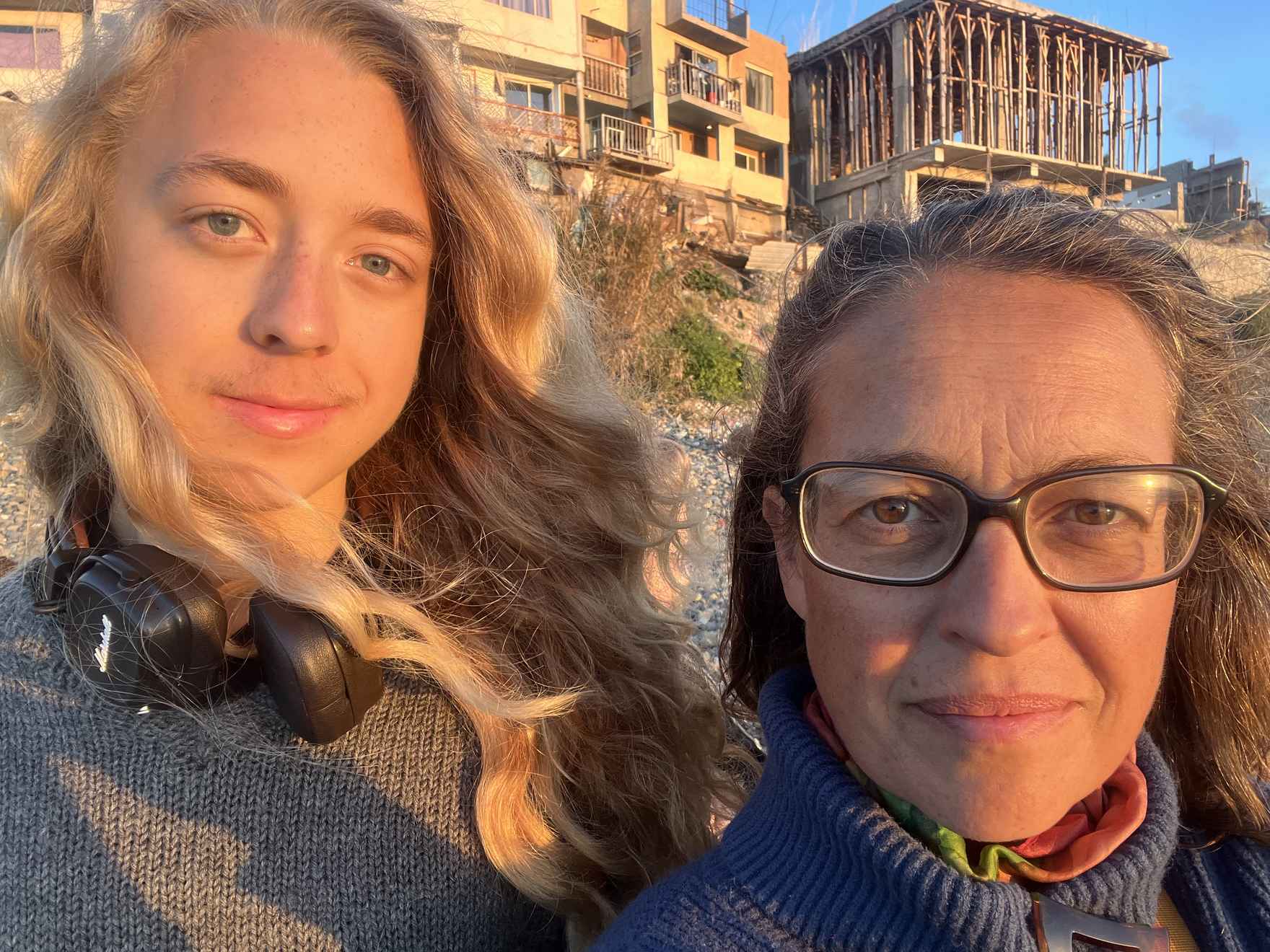Video Games: Fear, Curiosity, and the Art of Listening

I recently walked for several hours in Barcelona with my oldest son, age 19, discussing many interesting elements of life, as conversations go when there is enough time. And enough trust.
One of the themes was video games, and the fear and confusion parents have around them, and the level of conflict in many families.
My kids have been through a lot: ups and downs, fears and joy. Growing up in several countries, unschooled and exploring the world, inner and outer, we have been playing with how to handle many basic parts of life.
Including gaming.
I have tried letting go completely, "allowing" full immersion, no rules: Game all you want. At that point I was new to unschooling; inspired and impressed by people who said it was the right thing to do. Later, I tried limiting games to certain hours of the day.
I have tried with a full stop: no movies, no gaming, no social media, nothing. This was a more democratic experiment, and lasted full four years. Those were easy days. For me. But maybe I was lying to myself about how democratic, it really was. It was not fully authentic either, as I am no fan of rules.
And now I am back where I started: There are no rules.
Except this time I am smarter. More than ten years have passed. I read some books, had some discussions, did some research and a lot of thinking. Plus more than ten years of living.
I have also listened to the discussions, and talked as a professional with a lot of worried and frustrated parents.
Words like “addiction”, “rotting brain,” “wasted time,” “conflict,” “wasted potential” are blowing in the air. Parents are afraid. Children are frustrated. Parents are frustrated. Children are afraid.
How do we handle video games? Are they addictive? Are they a waste of time? Should we accept words like “screentime”, and use apps to cut off our children from using their devices? Should they have devices? Should we monitor what they download? What is the responsible, reasonable way to handle this?.
True and false: bridging the gaps
One big problem my son and I discussed over coffee and lovely vegan granola cakes, as they are served in the hip coffee shops in Barcelona, while taking pictures of the development of street art in Vila de Gracia, is the black-and-white problem, how the different opinions neglect the truth in the points of the counterpart.
It is true; there is probably no real addiction to any of the games. Calling the behavior of gaming an addictive one, is not respecting people struggling with real physical addiction. At the same time, negating the parallel saying it does not exist is ignoring the real obstacles parents meet around children who play games.
If we can begin the discussion by looking for the truth in the arguments we disagree with and the faults in the truths we hold ourselves to, I think we will get much further—closer to a truth to share.
A game is not just a game
Another big deal is talking about nuances. Video Games are a wide range of entertaining software on a wide range of different devices, ranging from little things on phones to elaborate multiplayer worlds online run by powerful computers backed by huge servers. They can be puzzles as well as stories, active and fast-running or slow-moving and thought-provoking.
Is it just gaming, or is it another use of the internet?
We call it videogames, but sometimes, when I talk to parents, they complain about a wide range of behavior - all of the time spent with anything with a computer chip. They could be texting friends.
This article only covers actual gaming, but bear in mind: Are you, as a parent, worried about ALL of the use of smartphones, tablets, and computers or JUST gaming?
Children and teenagers use their tools to do many different things on- and off-line:
They stay in touch with their friends and family, they watch shows and movies, they explore knowledge/knowhow/howto on different platforms, they take pictures, they share experiences, they make music, they listen to music, they listen to podcasts, they write texts, start businesses, they shop, the research before deciding things, they sometimes even do a good old phone call - or a more modern video call.
So, what exactly are we afraid of?
Initial thoughts on gaming
Assuming it is the gaming, I will move on, but I am also waiting for your answers. Let me know exactly your worries, and the more responses I get, the more nuanced my next articles on gaming and “screen time” will be.
Negativity and habits of communication
A lot of the discourse around video games is negative and evokes fear. This is very one-sided and disturbs conscious choices and good reason. Just like the one-sidedness in the discussion has the habit of people holding on to their own strategy by holding on to the eternal truth of a few arguments supporting this strategy, the highly negative discourse pushes real thinking over. It makes it very hard to talk about these things.
A very very good strategy is to think deeply about how you yourself might be wrong, and how your opponent might be right. Maybe just slightly. The golden middle ground will then appear and make you smarter and more flexible, allowing for exploration and learning - finding your own way. And in my artcile series on video games, screentime, social media consumption and the use of computer-chip in the lives of children, teenagers and young adults I need to explore all of the different perspectives, arguments, fears and celebrations.
Fear
Fear is your worst enemy. It makes you stupid. Irrational. Even selfish. Fear is not a playmate. It might be an alright alarm system, a state of mind that points you to what needs to be explored, worked on, and understood, but it is never a guide or a helper in making good choices. Fear is an efficient way to control other people, it is an uncontrollable force if we do not pay attention to the more poisonous stings in the attacks, and just allow it to do its thing.
The first defence is to be very good at noticing fear. Any fearful reaction in our own system needs some attention. If we allow it to crack open our beautiful wholeness, there is no end to the irrational reactions, and no end to how much it can spread. The illogical strange scenarios unfolding in our semi-subconscious minds will make us flare up and react to the smallest things, and blow up agitated arguments with our children where we do not really listen.
This will make things worse. The relationship and respect between the generations, between the caretakers and the caregivers, is the most important element in not just this part of life but in most parts of life. The choices we make, our well-being, the options we have.
If we do not have stable, comfortable, trusting, loving relations with the people we share our lives with, we will struggle on so many levels, I can not even begin to list them.
Takeaways from this reflection
The sun is shining over Barcelona today, it is Saturday as I am writing this reflection, and we are to go for a long walk as a family - all of us this time: We will check if they finished building La Sagrada Familia (a running and stupid dad-joke in our family), see if we can get a camera repaired and buy some homeopathic medicine for the dog - before we go to the top of the Shopping Center La Arena to enjoy the view on the way to the National Gallery of Catalonia. Hopefully our day will end with street artists around the old cathedral and gluten free pizza from Flax and Kale, before we head back in the sunset.
This is my beautiful context, and I will enjoy it, I promise. One element to cherish is the conversations, and I am sure, I will come back a bit smarter, knowing just a tiny bit more about bits of my children's lives.
Rule number one: Listen
This is the most important point of what I am saying here: The relation, the time spent, the respect, the curiosity and the trust will all allow us to understand what is going on. If we, the parents, hold on to the parental perspective thinking we know more, we know maybe everything important, we get to rule, we get to decide, we get to draw the lines in the sand, we maybe HAVE to draw the lines and make some rules to protect our offspring from … what exactly? … well, if that is the case, there is no true explorative curious conversation and we will never know what video games really are, what roles they play in the lives of the children, what they are good for and when they get in the way, what gear the kids need to enjoy this element of life and all the other things we need to know.
More importantly, we have no say, no knowledge, and no way of helping if there are real problems. We do not know what to look for, we do not know what they are, and our children will never tell us because by not listening, we have taught them that we will never understand, never ‘get it’, and never be of any real help.
Rule number two: Listen
The second rule is the same as the first: Please forgive me - Danes use a lot of sarcasm. When I use the word “rule”, I laugh, especially in this context: There are no rules, of course, and if there were rules, we would have to challenge them right away. That is one of the main purposes of rules. The other is some sort of guideline, accumulated strategy, I get that. But anyway. These are not rules; they are general ideas, and I laugh a bit in my Scandinavian way when I call them rules.
The other version of listening is listening to opposites. Listen more when you disagree, and listen carefully to the little flaws in your own arguments, the cracks in your own strategy. This is most helpful and very very healthy. Do it to become nuanced, do it to find a way.
Rule number three: Beware
Beware of fear. Fear is your enemy. Getting to know our own triggers is a solid strategy to become more mentally stable and to unfold life in a … well: let me just state it … in a BETTER way. There you have it. Judgment. A life based on or ruled by or even just slightly affected by unpolished, un-understood, un-unfolded and un-analysed fear is simply not as good as what we for the sake of efficiency could call “the opposite.”
Get to know your fear, your trigger points, your pitfalls, your dark side. It takes a lot of inner work to become a true master. To begin with, simply being aware and noticing is a very, very good start. Just note it: Oh - am I being affected by fear now? What am I really afraid of? What made me afraid? Is it real? Do I know it is real for real or what is going on? Who benefits from my fear now? What am I NOT seeing, while being afraid of XYZ? What about the rest of the alphabet?
Rule number four: Curiosity
Being curious, open-minded and spending some time is key. You probably have a beautiful area somewhere to go for a walk with your offspring and talk with them about everything and nothing - do that. Make it a habit of listening more than speaking. Understand they know a lot of things you don't know. You know other things. THis is not a competition or a test, but a matter of perspective - and if you approach the situation with curiosity and spend some time walking and talking with your children and if you have one your co-parent, it will build the foundation for a much more nuanced and rich handling of al that involves a computer chip and maybe the internet.
It is a good strategy for most people's relationships with their kids, but that is another story.
And spend some curious time exploring what the children want to show you in the area: mobile games, games on consoles and computers, games online—all of the games. Listen when they talk about them, watch them play, ask questions, and try to understand what is going on.
Enough of the rules. I need to stop writing now. As now is the time for that walk in Barcelona.
I am open to questions and ready to nuance this article. My next one will not be about gaming but all the different things kids do with their phones, tablets, and computers, so we are talking about the full picture.
Leave a comment, question, or thought in the comment section or write to me directly at hi@cecilieconrad.com—this makes the conversation real and allows us all to grow.
Have you read the latest articles by Cecilie Conrad?
Here you can find my latest writing - It is a mix of my blogposts and 2023 journaling. I hope you will enjoy it :)
Where are we now?
Want to stay up to date with our travels and podcast? Then sign up for our weekly newsletter











0 comments
Leave a comment